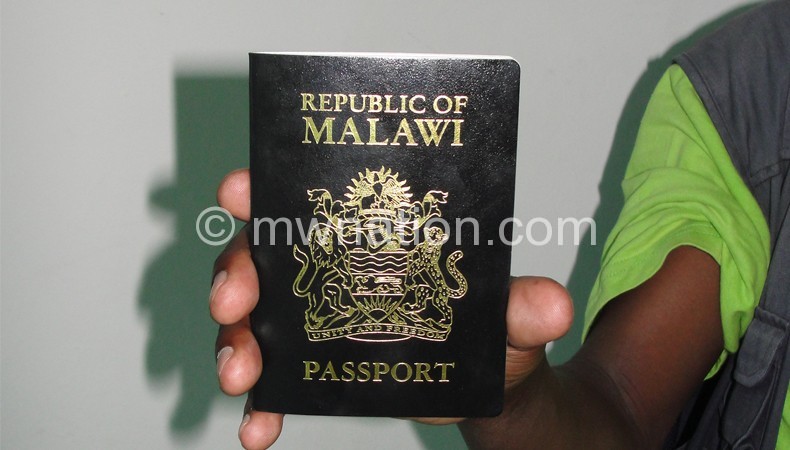New passport fees take effect Jan 14
Government has effected almost 100 percent increment in fees for processing passports, as the country moves away from the machine readable zone (MRZ) passports to electronic passports (e-passports).
In a gazette dated December 27 2019 which we have seen, Homeland Security Minister Nicholas Dausi has directed that issuance and renewal of an ordinary passport be pegged at K90 000 from the current K48 500.

Replacement of an ordinary passport with 36 pages, according to the gazette, is now at K150 0000 while issuance of an express passport is pegged at K180 000 from K68 500, representing 262 percent increase.
The new fees, which have attracted the wrath of Consumers Association of Malawi (Cama) executive director John Kapito as exorbitant, are effective next week Tuesday, January 14 2019.
Reads the Government Gazette: “In exercise of the powers conferred by section 40 of the Immigration Act, I, Nicholas Dausi, Minister of Homeland Security, make the following Regulations; These regulations may be cited as the Immigration [Amendment] Citation Regulations, 2019.
“The Immigration Regulations are amended by repealing the Fourth Schedule and replacing it with the new Schedule—Ordinary Passport, 32 paged booklet [a] Issuance of an ordinary passport K90 000; [b] Renewal of an ordinary passport K90 000; [c] Replacement of an ordinary passport K150 000; [d] Issuance of an express passport K180 000.”
Issuance and renewal of an ordinary passport with 46-pages will now cost K130 000; while replacement of an ordinary passport with 46 pages, and the express ordinary passport will cost K180 000. A certificate of identity travel document has moved from K10 000to K20 000.
Issuance and renewal of a 36 paged booklet- Passport for children under 10 years is now at K80 000 while replacement will cost K100 000.
The increment is not surprising, because the Department of Immigration and Citizenship Services already warned last year in August that the e-passport would cost both new passport applicants and holders $100 (about K75 000) per normal passport.
However, the new fees are higher when compared to neghbouring Zambia, where an ordinary passport costs 320 Zambian kwacha (ZK) equivalent of about just K16 000, while the Express passport costs ZK500 or about K25 000 at the exchange rate of K50.
Executive director for the Consumers Association of Malawi (Cama) John Kapito said while the issue of current passport holders has been addressed, the cost remains high.
“Basically, we had two issues. First was on what would happen to current passport holders and we have been assured that they will continue using them and can decide to change to e-passport even before they expire. Where we still have a problem is on the cost.
“We wonder where these people get such huge fees because when you compare regionally, our cost is too high. It is like government is using the costs to punish poor people, its preventing them from having a document that they should have without being charged exorbitantly.”
Kapito also blamed Parliamentarians for behaving ‘indifferently’ on a matter which required their attention as they could have helped ordinary Malawians whose disposable is low and struggle to earn it.
“We were expecting Parliamentarians to come out and protect people who vote for them, but they have been silent up to this point when the fees has been gazetted. It now becomes difficult for us to bargain at this point, we need collective voices,” he lamented.
Minister Dausi could not be drawn to comment, better placing Immigration Chief Masauko Medi, who said he could also not comment on the matter as he was attending a funeral.
Immigration Department spokesperson Joseph Chauwa did not respond on several attempts, but earlier told us that the e-passport is aimed at meeting International Civil Aviation Organisation security requirements which seek to enhance security.
An electronic passport, or e-passport, is the same as a traditional passport with the addition of a small integrated circuit (or “chip”) embedded in one of the covers or pages.





